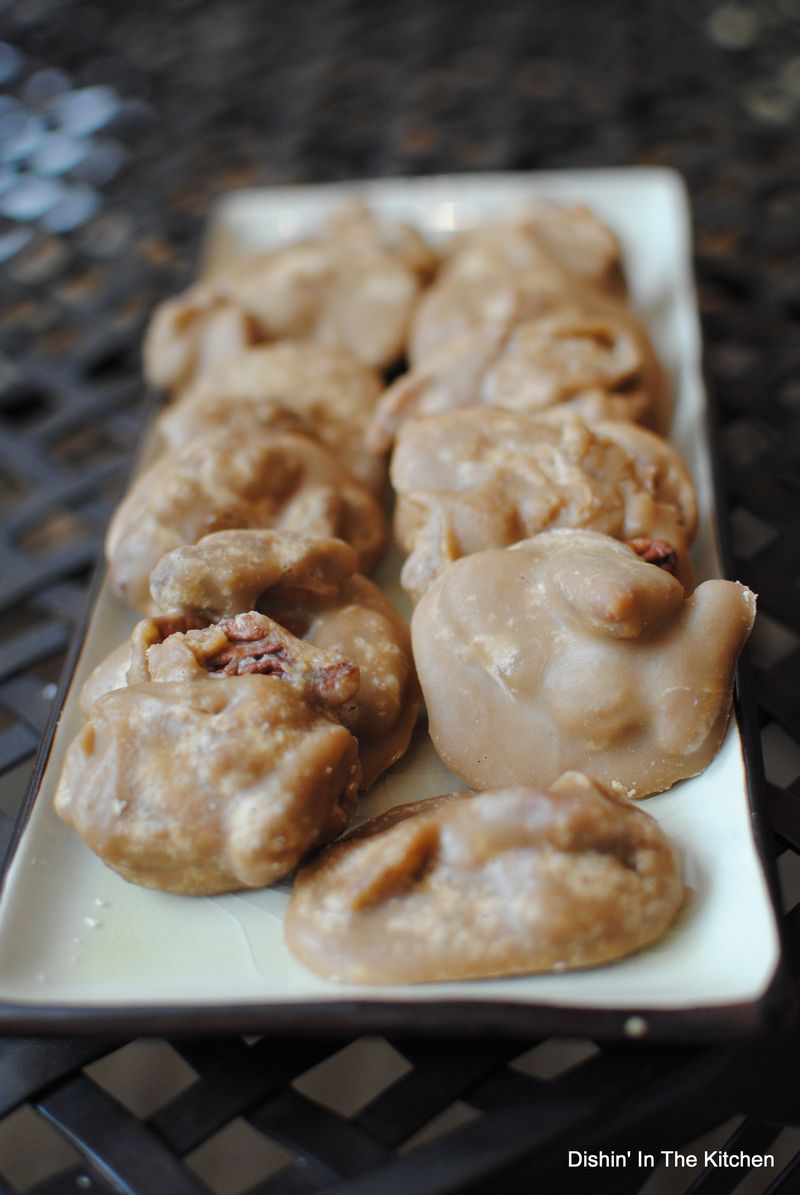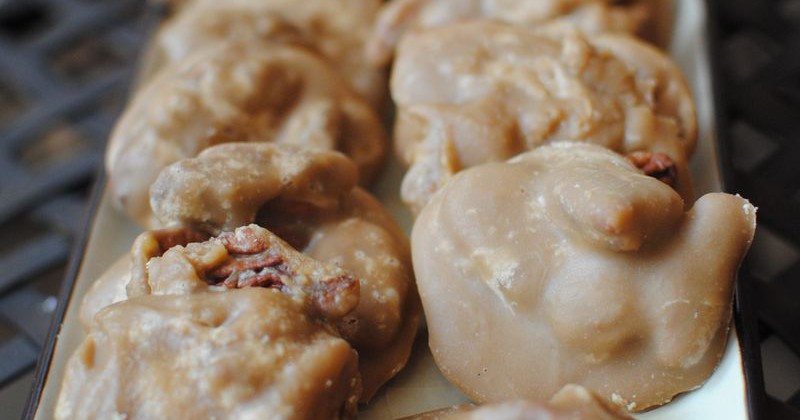Real Pecan Pralines
 Pecan Pralines- Photo Courtesy of Mac Ledesma at Dishin’ In the Kitchen
Pecan Pralines- Photo Courtesy of Mac Ledesma at Dishin’ In the Kitchen
Today is the Feast of the Epiphany, aka Twelfth Night and King’s Day. In southern Louisiana, it’s the beginning of Carnival season. King Cakes and Mardi Gras beads begin to appear in every home in the New Orleans area. I posted my recipe for King Cakes here last year, where you can also read more about Carnival season.
As my Carnival gift to you this year, I want to share a very special traditional recipe for pecan pralines, which we always had around holidays, even in Los Angeles, when I was a child.
“There were a lot of pecan trees around New Orleans, and sugar was cheap,” my mother told me, “so everyone made them.”
It’s true, everyone I knew in and from New Orleans made pralines, and I learned to make them at an early age. So I had to laugh when after the LA Helps LA event last fall (for which I made a couple batches of pralines), my cousin Raoul’s daughter, Kelly, who moved here from New Orleans only a little over a year ago, called to ask if I could give her my recipe for pralines. It was one of those cycle of life moments where I clearly got that I was the older generation now. I called Raoul, in New Orleans, and told him the story. Raoul is an excellent cook, but he said, “you know, I’ve just never been able to make pralines. I even went out and bought a candy thermometer, but just couldn’t get the hang of it.”
New Orleans pecan pralines vary from classic French praline, which is usually made with almonds, or sometimes hazelnuts, contain only white sugar, and no cream or butter. I suspect that although Louisiana was a French territory, and surely there were people who knew how to make classic praline, that the variation developed as many Creole dishes did- the settlers adapted and used what was available to them, pecans rather than the almonds of French praline.
Also, I’m sure it was pretty near impossible to make French praline, which is cooked to a hard crack and is more like a brittle. Sugar is hydrophilic (i.e. water loving), so classic praline would have absorbed moisture and melted quickly in the humid climate of Louisiana, so why not go with the moisture, and add the brown sugar and cream (actually, evaporated milk- again, I’m guessing it was pretty hard to get cream in southern Louisiana). I hope you will take the time to try your hand at making these pralines. Yes, if you visit New Orleans, you can buy them in the French Quarter, but they pale in comparison to real home made pralines.
And, yes, I told Kelly I would give her the recipe, but that really it was best to watch them being made. So on Christmas Eve when all the generations were gathered together, I asked Aida (another young cousin) if she would like to learn how to make pralines. Before she could get a word out of her mouth, her brother Martin, responded “Yes, she would!” We recruited my brother, Ric, to tape the lesson, and I’ve posted it here for you. In deference to Raoul, even though the recipe is simple, they are a little tricky, as you’ll see, but completely doable.
* Sugar cane has been grown in Louisiana since plantation times and still is today. The granulation process was invented in Louisiana, and Domino Sugar still maintains a large refinery in southern Louisiana.
Pecan Pralines
- 1 cup white sugar
- 1 cup brown sugar
- 2/3 cup evaporated milk
- 2 tablespoons butter
- 1 teaspoon vanilla extract
- A pinch of salt
- 1-11/2 cups pecan halves
- Combine both sugars in a sauce pan with the evaporated milk and stir to dissolve.
- Cook over medium high heat to soft ball stage (or a bit beyond really).
- Remove the pan from the heat, and stir in the butter, salt, vanilla and pecan halves.
- Pour pecan sugar mixture by tablespoons full onto parchment lined baking sheets, and allow to cool for 5-10 minutes. Peel off the parchment and enjoy!









12 Comments
Gisele–thanks for posting this recipe. I love pralines, but, have never tried making them. Will certainly give them a shot and let you know how it goes…yummmmmyyyy
January 6, 2011
Good luck with them, Lisa, and enjoy!
G.
January 6, 2011
Yea! The video looks fab. I always wondered why it was called “softball” stage. Now I get it. GREG
January 7, 2011
Thanks, Greg- yes “soft” can be a bit of an imprecise term.
January 7, 2011
Wow! I grew up on pralines in Texas. All the Mexican restaurants sold them by the cashier. They also had/have the chewy ones. I like the kind you made the best, yet I’ve never made them! Wish I could have tried your recipe while my mother was alive. She would’ve loved these! I think if two people spooned them onto the wax paper, it would be faster and easier. Nice video!
January 9, 2011
Personally,I hate making sugar based cenidas. Getting the stages right are hard and if your house isn’t very well temperatured or if it drafty or if you’re cooking on an old stove or worse yet an old electric stove, you’re never going to get it right. I’ll just stick with cakes/pies/chocolate candy making.
June 25, 2012
@Juca,
My aunts and great aunts who taught me to make these worked on old stoves in very badly temperatured houses. A real testament, I suppose, from what you are saying, to their ability.
June 25, 2012
Thank you so much for the video! I just made some fabulous pralines!
November 27, 2013
I really loved reading about how these came to be and also how you shared a tradition that will live on. Loved the video. The only problem I encountered was eating them as fast as they cooled. Thank you so very much for sharing your knockout unbelievable six star recipe. Jackie in Oklahoma.
September 19, 2017
Thanks so much, Jackie. Not too bad a problem to have, right?
October 13, 2017
NOLA Pralines just aren’t Pralines unless they have a stick of butter in the recipe and that recipe was handed out in New Orleans.
May 2, 2018
Unfortunately, New Orleans (most of us long timers don’t care for the acronym NOLA) is filled with people who are not from here, or who do not have ancestry here.
August 6, 2018